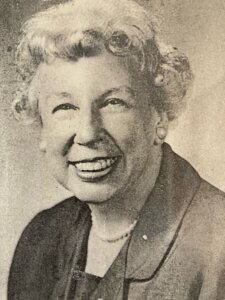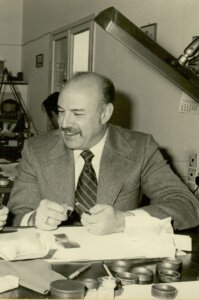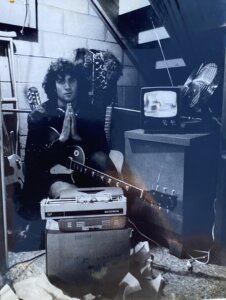How Black music brought me closer to Judaism
In those days in suburban Minneapolis, Jewish felt dorky; Marvin Gaye, Curtis Mayfield and John Lee Hooker felt cool

The author, Peter Himmelman, on the set of his ‘Waning Moon’ music video, 1987. Photo by John Kisch Archive/Getty Images
This is the first in a series of essays by Peter Himmelman exploring the intersection of Judaism, creativity, and rock ‘n’ roll.
Once, while my parents were away, my Grandma Min woke my three siblings and me at five in the morning to lecture us on the proper way to squeeze a toothpaste tube. Funny how effective that was. To this day, I can’t pick up a tube of Crest without thinking about how to squeeze it properly.
Toothpaste incident notwithstanding, I loved my Grandma Min. She was a rule-breaker and a rebel. Among the first Jewish women in Minneapolis to march for civil rights, she regularly hosted Black community leaders in her apartment and served them her own brand of soul food: blintzes, kugel, borscht, and mandelbrot. Everyone she touched — including me — was changed for the better. She’s the one who introduced me to the world’s greatest guitar teacher.

One Sunday afternoon, in the midst of a brilliant sun-shower, Lester Williams pulled up to our house in his pale-yellow Fleetwood Brougham. There’s little question that he was the first Black man to park a Cadillac on our block and walk to the door of a Jewish kid’s house for a guitar lesson.
It was Grandma Min’s idea. She’d seen Lester perform at a Hadassah luncheon, singing songs from Fiddler on the Roof with a big archtop Gibson and a tambourine balanced on his shoe. Afterwards, she asked if he’d teach me.
Lester, who was in his mid-70s at the time, wore a high-rise Don King hairdo and played in a style that was equal parts Texas blues and Yiddish theater. He taught me Sam Cooke’s ”You Send Me” and Lightning Hopkins riffs. When he sang, his eyes closed like he was singing for the Lord.
To this day, I’ve never opened my guitar case without thinking of Lester.
Back then, Jewish felt dorky; Black felt cool. In the early ’70s, a newly bar-mitzvahed kid playing funk and blues was an anomaly. Now, of course, the pop charts are built on it, but in the day it was the Eagles and Jethro Tull, not Kanye and Kendrick Lamar.
I was drawn to the groove and gravitas of Black music — Marvin Gaye, Curtis Mayfield, John Lee Hooker. It wasn’t only sound; it was a worldview. There was truth in that rhythm: sophisticated, sardonic, somehow sacred. It hovered between sex and Godliness. You could put a record on the stereo and feel righteous about reproducing the human species to it. To play that music, you had to become it, not just imitate it. I developed a lilting accent that slipped in naturally when I sang, like a thing that made down-in-the-bones sense. Every rock musician had done it in some form — Jagger, Van Morrison, the whole British Invasion.

It was a bridge to something larger, a way to escape the confines of white suburbia and begin what would become a lifelong expansion of my creative and spiritual boundaries. In retrospect, it may have been the first step on the path that led me to become an observant Jew.
Most of the kids around me seemed content inside their circumscribed worlds of hockey, keggers and Sadie Hawkins dances. I wanted to erase the margins someone else had drawn around my life. The times I could do that were rare, but they happened most powerfully when I was making music. It was then that the world lost its edges. The interplay between musicians could feel like one spirit inhabiting separate bodies. That’s how it felt when I first played with Wynston Robyns.
At my cousin Jeff’s house near Cedar Lake, we jammed in the basement — low ceiling, unused shuffleboard court in the floor, winter coats piled on the Ping-Pong table. Some older Black guys from the North Side brought their gear, a little weed, and some Ripple wine. I’d never tried Ripple before. I drank to excess.
Soon the room came alive: guitars tuned, reeds moistened, drums whacked, a few tentative chords tossed out. First rhythm, then flight. Jeff on the Fender Rhodes, me on guitar, all of us tearing it up. After an hour, the alto sax player, Jimmy, said, “You boys gotta meet Wynston Robyns.”
With Jeff’s parents away and my parents asleep and dreaming back at my house, we piled into Jimmy’s car and drove north, well past the safety of our suburb. By the time we reached Wynston’s place it was close to one in the morning. Dim light spilled from the basement windows, bass and drums rumbled from below. When Wynston finally opened the door, he filled its frame: barrel-chested, magnetic, with a half-smile suspended between welcome and menace.

We smoked more weed and played until God knows when. Some Stevie, some Lou Rawls. It was nearly dawn when Jeff and I became the new members of Wynston Robyns and Soul SearchLyte.
Rehearsals were constant — four nights a week, sometimes after school, sometimes before. Neither of us was old enough to have a driver’s license, so we took the city bus.
It took months for Soul SearchLyte to land just two gigs. The first was a corporate lunch my dad attended in a suit and tie. “Wynston seems like a really nice guy,” he said afterward, which was true…mostly. The second was New Year’s Eve at the Holiday Inn downtown. We were the “headliners,” scheduled for 1:00 a.m. — which everyone in the business knows means the time everybody has gone home to party. The real headliners went on at midnight. It was another North Side band, Champagne, featuring Morris Day, André Simone, and a diminutive guy with a large afro.
Jeff and I watched them in awe. André’s bass ran through a Mu-tron Funk Box that made every note sound like it came from the world’s best wah-wah. Morris Day’s drumming was tight, crisp, unstoppable. Wynston leaned toward me and shouted over the groove, “You see that guy? The way he chops out that rhythm? His name’s Prince. They say he’s got a record deal on Warners. Peter, that’s what you need to do if you wanna be more than just a basement guitar player.”

No offense to Soul SearchLyte, but Champagne was a brutal act to follow. By the time we went on at 3:00 a.m., only my Uncle Sonny and the bar staff were still around, mopping the floor while we played our hearts out.
A few weeks later, during rehearsal, our lead guitarist, Larry Crags, announced he was quitting.
“Wynston, I’m afraid I’m gonna have to leave the snap,” he said.
Wynston stared at him. “What the fuck did you just say?”
Larry shifted his weight. “My wife thinks it’s not a good idea — all this practice when we haven’t got any gigs lined up.”
Wynston stepped forward and jabbed his finger into Larry’s chest. “You sayin’ I’m not a man?”
It was strange. Larry hadn’t said anything of the sort.
Before Larry could answer, Wynston swung and caught him square in the face. Larry, who’d once told me in strictest confidence he was a Kung Fu master, fell hard, then rose, bloodied, into a fighting stance. Having been an ardent viewer of Kung Fu, the TV series, I waited for the mystical retaliation. It never came. Wynston hit him again, a clean right hook that sent him flying into my amplifier.
Larry crawled away, whimpering, up the stairs and out of the house. Jeff, maybe out of shock, started playing ”Rock-A-Bye Baby” on the high keys of his electric piano. From behind the drum kit someone said flatly, “Why don’t somebody shut off that amplifier?”
Wynston, panting hard, looked at me. “Peter, I suppose you wanna quit this snap too, since you’ve just seen a Black man beat up on a white dude.”
“No, Wynston,” I said. “I love being in this band.”
Hell yes, I did. I just became the lead guitarist.
Those nights in North Minneapolis — half teachable moment, half transcendence — were my first real taste of faith: the moment when music, spirit and belonging coalesced into one sound, one rhythm, one funky-ass pulse of Creation.
I’m positive Grandma Min would approve.















